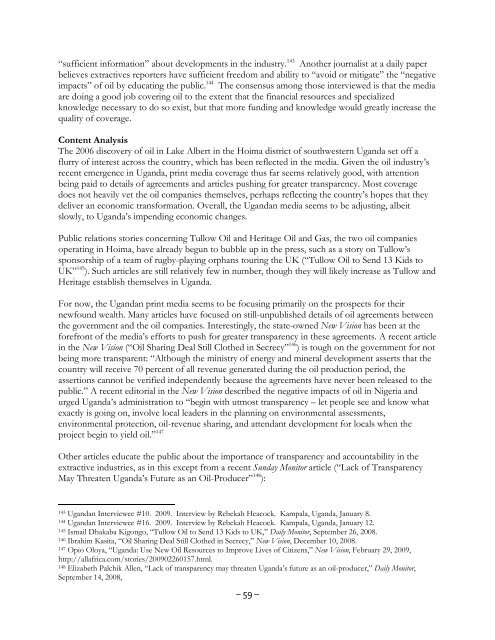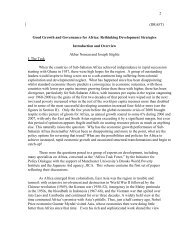NewspapersUganda’s print media are dominated by two major newspapers, the state-owned New Vision and theDaily Monitor. The New Vision and its local language publications, Bukedde (published in Luganda),Etop (Ateso), Orumuri (Runyakitara) and Rupiny (Luo) have the largest market share, with a combineddaily circulation of over 60,000. The Daily Monitor, owned by the Kenya-based Nation Media Group,has a daily circulation of 15,000. Other notable publications include the weekly East African, RedPepper, Observer and Sunrise.Though newspapers cover the widest range of topics and provide the most extensive politicalcoverage of all media in Uganda, less than 1 percent of households report print media as theirprimary source of in<strong>for</strong>mation, according to the BBC World Service Trust. Newspapers are alsosubject to the same government pressures as radio and television, and several journalists reporthaving been physically attacked and/or charged with crimes ranging from sedition to the moregeneral “media offenses” after publishing stories seen as threatening to the ruling party.Business and Economic JournalismMost of those interviewed were disappointed with the quality of business and economic journalismin Uganda. The general consensus is that business reporting does not receive enough emphasis inthe Ugandan media (business journalism is “used as filler” in most papers, said one associate editor).Newspapers often fail to support the business desk to the satisfaction of business editors andreporters. Summing up this view, one reporter <strong>for</strong> a major daily emphasized the need to “convincemanagement to attach more importance to business reporting.” 141 Several interviewees did note thatthings have improved in the last three to five years: one indicator of this is that both the DailyMonitor and The New Vision began publishing weekly business inserts in late 2008.Several of those interviewed attributed the overall lack of focus on business journalism to Uganda’sgeneral business climate: “the Ugandan economy is resurrecting from a long slumber” after IdiAmin’s destructive economic policies, said one reporter, and the country has little industrial activityon which to report. Still, many others complained that most stories are reported from theperspective of businesses or exporters and fail to relate business news to consumers and ordinarycitizens. In 2005, the World Bank estimated that 90 percent of Uganda’s non-farm privateemployees operate in the in<strong>for</strong>mal sector 142 , but Ugandan business stories usually focus exclusivelyon the <strong>for</strong>mal sector, ignoring a substantial part of the country’s economic activity.Regardless of the reasons <strong>for</strong> this weakness, the majority of those interviewed agreed thatstrengthening business journalism in Uganda is vital: “politics will never stabilize when the financesare not okay,” said one editor, stressing the need <strong>for</strong> better and more comprehensive businessreporting. “Everything is business-oriented somehow.”Extractives JournalismUgandan media began reporting on the oil industry in 2006, when the discovery of oil was firstannounced to the public. One reporter who covers the industry <strong>for</strong> a major daily paper said there is“all sorts of lively commentary…all the time” about oil in the media, and he believes the public has141 Ugandan Interviewee #11. 2009. Interview by Rebekah Heacock. Kampala, Uganda, January 9.142 World Bank, “Urban In<strong>for</strong>mal Sector in Uganda,” April/May 2005,http://info.worldbank.org/etools/docs/library/211247/Uganda_Urban percent20In<strong>for</strong>mal percent20Sector.pdf.– 58 –
“sufficient in<strong>for</strong>mation” about developments in the industry. 143 Another journalist at a daily paperbelieves extractives reporters have sufficient freedom and ability to “avoid or mitigate” the “negativeimpacts” of oil by educating the public. 144 The consensus among those interviewed is that the mediaare doing a good job covering oil to the extent that the financial resources and specializedknowledge necessary to do so exist, but that more funding and knowledge would greatly increase thequality of coverage.Content AnalysisThe 2006 discovery of oil in Lake Albert in the Hoima district of southwestern Uganda set off aflurry of interest across the country, which has been reflected in the media. Given the oil industry’srecent emergence in Uganda, print media coverage thus far seems relatively good, with attentionbeing paid to details of agreements and articles pushing <strong>for</strong> greater transparency. Most coveragedoes not heavily vet the oil companies themselves, perhaps reflecting the country’s hopes that theydeliver an economic trans<strong>for</strong>mation. Overall, the Ugandan media seems to be adjusting, albeitslowly, to Uganda’s impending economic changes.Public relations stories concerning Tullow Oil and Heritage Oil and Gas, the two oil companiesoperating in Hoima, have already begun to bubble up in the press, such as a story on Tullow’ssponsorship of a team of rugby-playing orphans touring the UK (“Tullow Oil to Send 13 Kids toUK” 145 ). Such articles are still relatively few in number, though they will likely increase as Tullow andHeritage establish themselves in Uganda.For now, the Ugandan print media seems to be focusing primarily on the prospects <strong>for</strong> theirnewfound wealth. Many articles have focused on still-unpublished details of oil agreements betweenthe government and the oil companies. Interestingly, the state-owned New Vision has been at the<strong>for</strong>efront of the media’s ef<strong>for</strong>ts to push <strong>for</strong> greater transparency in these agreements. A recent articlein the New Vision (“Oil Sharing Deal Still Clothed in Secrecy” 146 ) is tough on the government <strong>for</strong> notbeing more transparent: “Although the ministry of energy and mineral development asserts that thecountry will receive 70 percent of all revenue generated during the oil production period, theassertions cannot be verified independently because the agreements have never been released to thepublic.” A recent editorial in the New Vision described the negative impacts of oil in Nigeria andurged Uganda’s administration to “begin with utmost transparency – let people see and know whatexactly is going on, involve local leaders in the planning on environmental assessments,environmental protection, oil-revenue sharing, and attendant development <strong>for</strong> locals when theproject begin to yield oil.” 147Other articles educate the public about the importance of transparency and accountability in theextractive industries, as in this except from a recent Sunday Monitor article (“Lack of TransparencyMay Threaten Uganda’s Future as an Oil-Producer” 148 ):143 Ugandan Interviewee #10. 2009. Interview by Rebekah Heacock. Kampala, Uganda, January 8.144 Ugandan Interviewee #16. 2009. Interview by Rebekah Heacock. Kampala, Uganda, January 12.145 Ismail Dhakaba Kigongo, “Tullow Oil to Send 13 Kids to UK,” Daily Monitor, September 26, 2008.146 Ibrahim Kasita, “Oil Sharing Deal Still Clothed in Secrecy,” New Vision, December 10, 2008.147 Opio Oloya, “Uganda: Use New Oil Resources to Improve Lives of Citizens,” New Vision, February 29, 2009,http://allafrica.com/stories/200902260157.html.148 Elizabeth Palchik Allen, “Lack of transparency may threaten Uganda’s future as an oil-producer,” Daily Monitor,September 14, 2008,– 59 –
- Page 1 and 2:
THEREWILLBE INKA study of journalis
- Page 3 and 4:
AcknowledgementsThis paper has bene
- Page 7 and 8:
Executive SummaryPurpose of the Rep
- Page 9 and 10:
journalists in these countries that
- Page 11 and 12:
Existing International Training Opp
- Page 13 and 14: • Consumer Affairs and Informatio
- Page 15 and 16: Background 3Of the three countries
- Page 17 and 18: pervasive conflict in the Niger Del
- Page 19 and 20: 3) Crises or disruptions, where som
- Page 21 and 22: Low pay and low regardOne of the mo
- Page 23 and 24: Even in cases where working journal
- Page 25 and 26: But while some reporters think FOIB
- Page 27 and 28: When asked how much the media could
- Page 29 and 30: the effects of these challenges for
- Page 31 and 32: detailed analysis of the opportunit
- Page 33 and 34: journalist said he has, however,
- Page 35 and 36: completely make use of some of the
- Page 37 and 38: money. Their knowledge of what medi
- Page 39 and 40: Notes on conducting research in Nig
- Page 41 and 42: Ghana- 35 -
- Page 43 and 44: evenues each year,” 106 which wou
- Page 45 and 46: entertainment news, scandals, and p
- Page 47 and 48: The rise of business-focused journa
- Page 49 and 50: coverage of the oil industry is als
- Page 51 and 52: needed supplementary income to cash
- Page 53 and 54: as supporting one political party o
- Page 55 and 56: Numerous journalists recounted how
- Page 57 and 58: Training programs available to busi
- Page 59 and 60: Amos Safo, editor-in-chief at the p
- Page 61 and 62: Notes on conducting research in Gha
- Page 63: Background 136Literacy and Educatio
- Page 67 and 68: or criminal charges for content the
- Page 69 and 70: have such difficulty obtaining info
- Page 71 and 72: The majority of those interviewed b
- Page 73 and 74: commitment to their profession and
- Page 75 and 76: Notes on Conducting Research in Uga
- Page 77 and 78: Recommendations for Revenue Watch I
- Page 79 and 80: people who have no journalism backg
- Page 81 and 82: analyzes business,” he said, “e
- Page 83 and 84: A journalist with The Punch said,
- Page 85 and 86: The Media Foundation for West Afric
- Page 87 and 88: Length of TrainingRoughly three-qua
- Page 89 and 90: industries, for instance, ought to
- Page 91 and 92: otherwise being published in the pr
- Page 93 and 94: Non-Training Recommendations for Ug
- Page 95 and 96: Appendix A: NigeriaPotential Partne
- Page 97 and 98: journalists. Biakolo is very profes
- Page 99 and 100: Television Stations• Nigerian Tel
- Page 101 and 102: have two to four month professional
- Page 103 and 104: City: AccraTelephone: +233 (021) 22
- Page 105 and 106: Fax: +256 414 255 495E-mail: umdf@a
- Page 107 and 108: • What do you think are the most
- Page 109 and 110: Appendix E: Survey Questions1. Name
- Page 111 and 112: 18. How effective were the teaching
- Page 113 and 114: 28. What are the most important cha
- Page 115 and 116:
1. Journalists by Country2. How wou
- Page 117 and 118:
5. How often do you travel out of t
- Page 119 and 120:
9. Which organization(s) sponsored
- Page 121:
12. After completing the training(s














